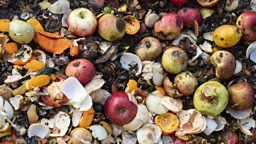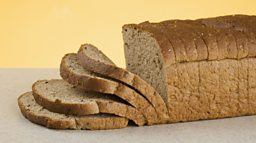Could you save a fortune by cracking down on food waste?
As the cost of living continues to rise in the UK, households across the country are looking for ways to try and cut back and save money. Could the answer be to reduce the amount of food we throw away?
For the latest episode of The Big Green Money Show, Dragons' Den star Deborah Meaden and Radio 5 Live's Felicity Hannah find out about how much damage the issue of food waste is doing to the planet and our finances.

A third of all food produced around the world is wasted
The United Nations Food and Agriculture Organization says 1.3 billion tonnes of food is wasted globally every year, which is one third of all food produced for human consumption.
In the UK, 4.5 million tonnes of edible food is wasted in UK homes every year, which, according to the environmental charity Waste & Resources Action Programme (WRAP), would fill Wembley Stadium eight times over.

The vast majority of food waste in the UK comes from our homes
While you may think the big supermarkets and large scale food manufacturers produce a lot of waste, food from our homes is by far the biggest contributor to food waste in the UK.
"About 70% of food wasted comes from our homes... I think it’s something a lot of us don’t actually realise... WRAP knows lots of us are concerned about climate change but not many of us make the connection between wasting food and climate change.” says Helen White, household food waste advisor at WRAP.

The average family could save 拢730 a year if it cut down on food waste
The most recent food waste data from Helen's organisation, WRAP, estimates an average family with children bins 244kg of food every year, the equivalent of 580 meals.
“When I think about things like the energy price increase that we all experienced in April, that was about £700" says Helen.

We bin 20 million slices of bread a day
And that's just in the UK.
Helen says: "The amount of bread that we throw away each year, it’s like generating 318,000 tonnes of CO2 equivalent… and that means that over 200,000 hectares of land are being used unnecessarily each year to grow the crops to produce it."
One of the issues is around people not knowing the best way to store foods. Research conducted during the pandemic found only 48% of people know apples last longer in the fridge, only 45% know fridges should be set to 5 degrees or less, and only 58% know poultry can be frozen up until the ‘Use By’ date.

Is treating our homes like a business the solution?
One tip to reduce food waste in our homes is to treat it like a business would, as a cost to its bottom line.
WRAP estimates the hospitality and food service industry throws away 1.1 million tonnes of food every year, which costs the industry £3.2 billion.
Mark Selby, co-founder and CEO of Mexican restaurant chain Wahaca, says one of the ways his business keeps food waste as low as possible is by using data: “We have to use our best guess through sales data analysis to say 'right, what do we think is coming in? What's the normal sales pattern? What do we need each day?' and we prep to that level."

Deborah and Fliss also hear from the co-founder of an app that's been designed to help us reduce the waste from our kitchens and cupboards, they offer top tips for the best fish finger sandwich of your life, and find out who did and didn't know you can freeze cheese!
